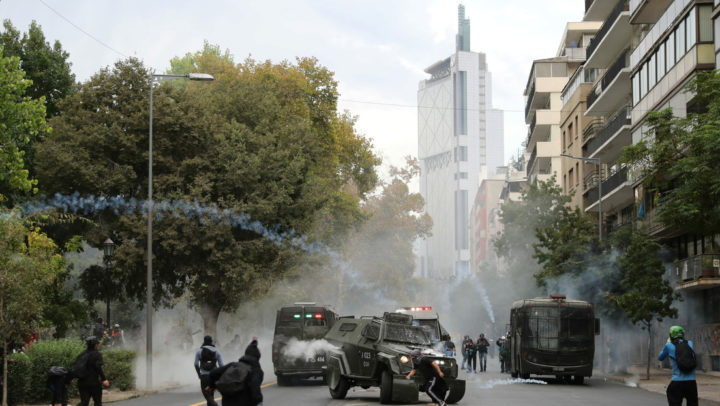It seemed that nothing would ever happen in this country. Pinochet’s dictatorship, by far the most astute, calculating and efficient of all, sought not only to combat the left and any dissent, but also to reformat the soul of Chile, with all the calculated fascist tidiness and methodical elimination of everything human from the national daily life. I remember a piece of graffiti from the 1990s in Santiago that said “Chile does not think, it only produces”. At the same time, on a visit, Jose Saramago concluded: “It is a country of the living dead and the living dead”. It was a scorched earth, which seemed sterile, dead, unproductive. But it was not true.
Life sprang to life on 18 October 2019, when millions of Chileans in an unexpected – not even for themselves – psychosocial phenomenon, took to the streets and squares all over the country to say No to the savage neoliberalism, which had in Chile its domination of origin and its trademark.
Throughout the length and breadth of the country, the people resisted in the streets for 5 months of an unequal and heroic pitched battle against the army and the special forces of the police and when the pandemic came, the same people, through the spokespersons at the front line of their resistance, notified their decision to leave the streets for a while to protect health and lives, because life is what we fight for.
The government of Sebastián Piñera, an opportunistic businessman with capital letters, took full advantage of the situation. If Piñera had the feeling of gratitude, he should put up a monument to the coronavirus. Many of us in Chile are convinced that it was precisely the pandemic that saved him from an imminent downfall. With the excuse of the health crisis, the country has been under a state of emergency since 18 March last year, with a curfew and the military on the streets, repressing any expression of public dissent.
All this time the roar of helicopter propellers in the Santiago night and the news of torture in police stations and assassinations by the forces of law and order became more and more a daily occurrence, reminding Chileans of the worst years of their history.
With the nightmares of the past, the systematic repression against everything that smells of popular organisation has returned. While the inhabitants of poor neighbourhoods, suffering hunger and all kinds of needs, as in the years of Pinochet, are organising themselves and making soup kitchens and popular eateries, the special police forces attack precisely these places as military targets.
It is important to understand that these are not isolated mistakes or excesses but a state policy of a government that bets on terrorising the people who for the first time rose up massively against the Chilean capitalist model, recently so successfully publicised all over the world. The repressive forces act with total impunity with the support and complicity of the entire political class, which, as always and at all costs, tries to prevent any fundamental change.
Despite the fact that for obvious reasons there are fewer demonstrators than before, the government with all its military and police has clearly not succeeded in taking back the streets. The streets of Santiago and other Chilean cities are in a state of suspended time, ready to start moving again at any moment. That is why there is so much fear of power that generates more and more violent and irrational responses.
After 18 October 2019, 8,581 legal proceedings were opened for human rights violations, most of them involving state agents, for various types of aggressions, including eye injuries and sexual violence. Of these cases, 46% were closed without formalisations. In the first 5 months of protest alone, around 460 protesters were shot in the eyes, as a result of intentional marksmanship by the carabineros. Also, dozens of people have been killed, hundreds tortured and thousands arrested.
This government continues to show increasing disregard and indifference to dozens of complaints and reports from various international and national human rights organisations. The actions of the carabineros are becoming more and more criminal and with less and less appearances. The brutality of the repressive action now systematically reaches health brigades and human rights observers who, risking their own safety, accompany the victims and document the aggressions they are subjected to.
And obviously the special target of the repressive forces is the independent press, the only and the first to be with, alongside and within the people to tell what is happening to them. While the mainstream media are engaged in this worldwide rehearsal of fear, our journalists, with no other calculation than what their heart dictates, continue to tell this beautiful story of a people standing up and walking towards another place in history.
Here we present the words of our dear colleague, the Chilean journalist Claudia Andrea Aranda Arellano, correspondent of the international agency Pressenza and collaborator of ‘Desinformémonos’, who in the last year and a half has been detained four times, the last time on 19 March 2021, when she was arrested in the middle of an operation without any justification, spent several hours kidnapped, tortured and was threatened with death.
All those months she put aside all her work and personal plans to accompany in the streets of Santiago the Chilean popular rebellion that without and with the pandemic continues and will continue, despite the silence of the press. And to her, all our solidarity and admiration.
In the meantime, the Chilean streets, once reclaimed by the people, remain a territory of resistance.












